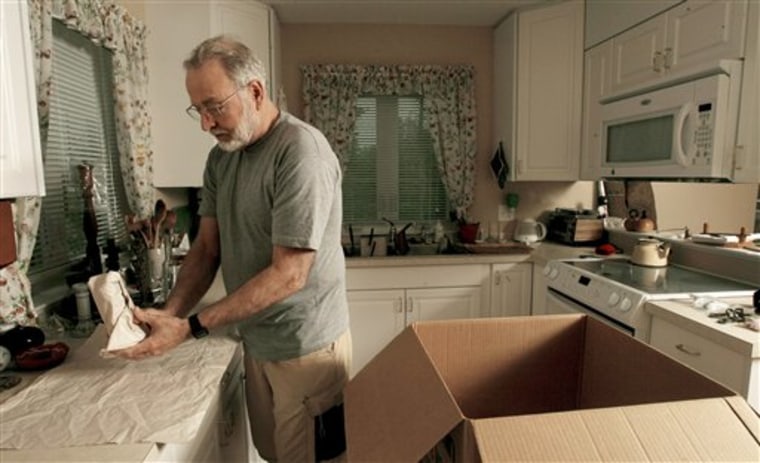Clergy seem an unlikely group to be facing a retirement security crisis.
They generally are looked up to by their parishioners as wise and frugal. Their pay, although modest, is enough to get by on. And they typically are provided with housing during their careers.
Yet many find themselves in a financial quandary as they approach or reach retirement, squeezed by challenges that sometimes exceed those of other professionals. Often lacking home equity and a pension, some are struggling to get by and others are staying on the job longer.
The root of the problem is not just limited pay or retirement compensation, according to the Rev. Dr. Bert White, a retired Methodist clergyman and lecturer at Boston University. It's a lack of financial literacy among people who really need to take control of their personal finances or risk ending up in dire straits.
"Clergy are so focused on the hereafter, but we should know more about planning for life after work," White says.
The Rev. Richard Matthews, 72, a retired Methodist minister from Gilford, N.H., finds himself in a financial plight he never imagined possible.
After 46 years in the ministry, he receives just $1,200 a month in retirement income, most from Social Security. He is on food stamps and had to turn his thermostat down to 52 last winter so he could afford to pay his heating bill.
Matthews' annual pay package was about $75,000 when he retired from full-time duty in 2005 — about half in salary and the rest for housing and other benefits. Yet his pension income is only about $300 a month.
Stock investments once worth $200,000 were eroded in the market meltdowns of 2000 and 2008, and he had to use most of what was left to pay off a mortgage after selling his home at a loss this year.
"I went into this profession not expecting to become a wealthy person," he says. "I went into this expecting that I would be cared for by the church and the congregations that I served, only to find that when we get to the end of the road ... I'm no longer cared for. That's very difficult to swallow."
Matthews admits to some bitterness at both the church for his meager pension and at "greedy" hedge funds that mismanaged his money. He is moving later this month to Sweden, where he founded and headed a church for 10 years, so he can afford health insurance.
A senior minister at a small to medium-sized U.S. church receives average pay of $70,300, according to a survey by the National Association of Church Business Administration. About 13 percent of respondents reported not receiving any retirement benefits at all, while churches are making very small contributions to the retirement plans of many others, according to the inter-denominational Christian organization .
"As ministers start approaching retirement, they all of a sudden say 'Wow, I'm behind,'" says Simeon May, the group's CEO. "Especially if they're in an independent situation or a small church, they could find themselves in real trouble."
The problem is particularly acute in New England, where the population is older and most churches are small and struggling financially as congregations shrink. Many are unable to fund pastors' pensions just as many are nearing retirement.
The Rev. Peter Beckwith, 55, pastor at South Gorham Baptist Church in Gorham, Maine, considers himself an exception to the rule in that his thriving church has an excellent retirement plan. But he says many of his peers effectively receive less than the minimum wage, because their pay package includes money that they must pay out for expenses such as work-related travel and other professional expenses.
Retired clergy in the region and their spouses sometimes have trouble putting food on the table and are dealing with foreclosure and unaffordable medical bills — "some really sad situations," according to Lisa O'Donoghue, director of clergy family services for the Preachers' Aid Society of New England.
An aversion to financial matters coupled with a trust in God to take care of things can be counterproductive when it comes to planning for retirement, she notes.
The Rev. John Wimberly, pastor of the Western Presbyterian Church in Washington, D.C., is on track to retire in two years at 65 thanks to a good pension and diligent saving. He and his wife even have a second home in Mexico. But a lot of his peers are pushing back retirement or simply are in denial about retirement planning.
"Moderate to progressive clergy in particular tend to look at money like it's going to tempt us, and become a big problem," Wimberly says. "Then they get to retirement and they haven't saved."
A pervasive attitude toward retirement within the profession has long been that God will take care of it, ministers and others say.
When White was being ordained 40 years ago, his bishop told him "Bert, you won't ever make any money as a clergyman but you'll always have a great retirement plan."
"I said, 'Oh, really?'" the minister recalls. "He said, 'Yeah, it's eternal life after you die.'"
It's important, though, for clergy to have their earthly affairs in order. White plans to deliver that message at a financial literacy and retirement planning seminar he is organizing on June 23 at the Boston University School of Management.
Their unpreparedness has a ripple effect that extends to the parishioners they counsel, from the pulpit or in private, and beyond the church.
"Clergy people have a profound multiplier effect," says Zvi Bodie, professor of finance at Boston University, who will be speaking to the clergy about investing. "Everybody goes to them for advice about everything, including finances. So it's particularly important to make sure that they have basic financial understanding."
Much like they give counsel, he says, clergy shouldn't be afraid to seek help with their own retirement security from a financial planner.
